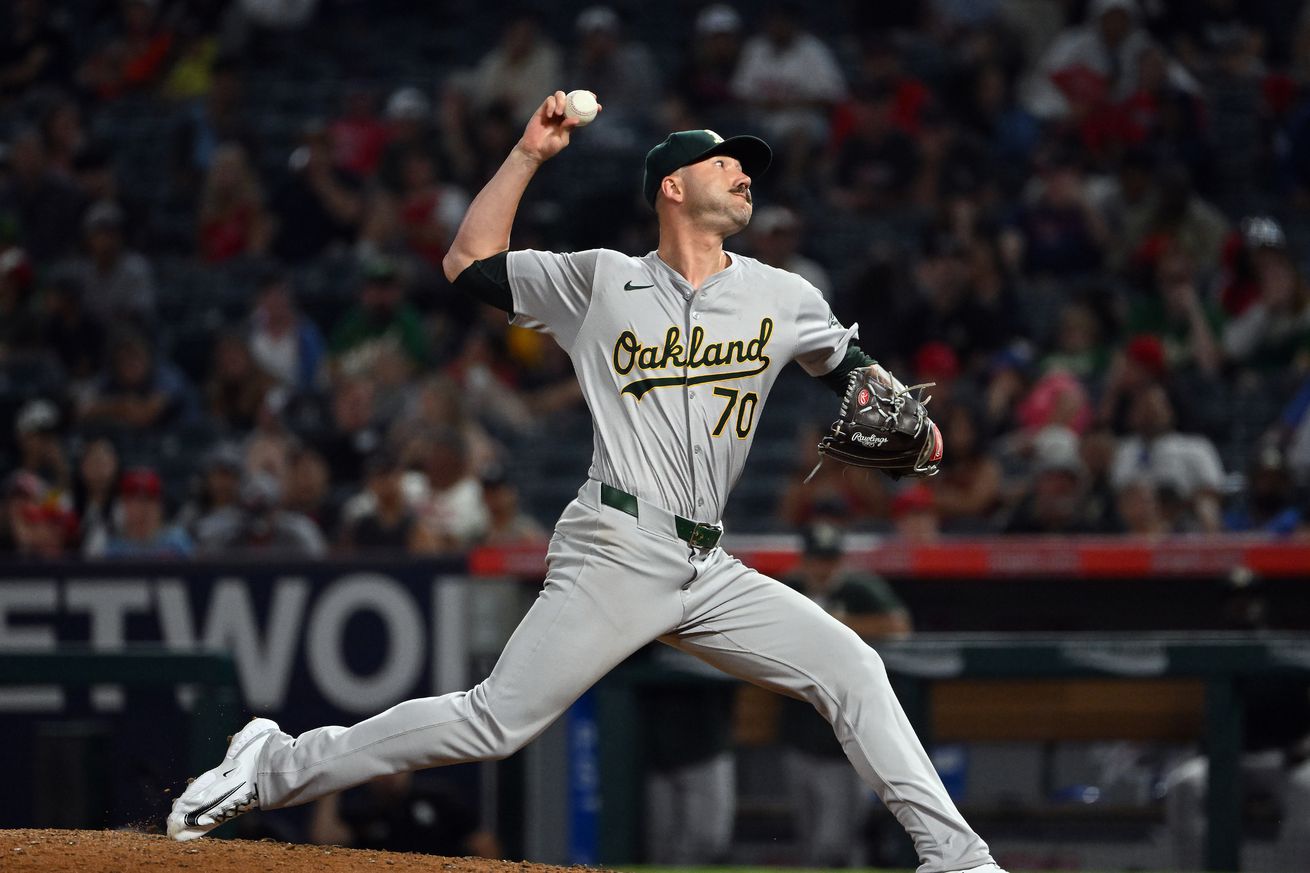
Time will tell whether the deals the A’s made at the deadline look great, good, medium, bad, or terrible in hindsight. All we can do now is give a review based on the information Oakland had at the time.
Time won’t tell about deals that were never made because who knows what they could have been? All we do know is that Mason Miller, Brent Rooker, and several other A’s whose names came up in possible deals, are staying put for now.
Here is my best attempt at some analysis just moments after the A’s pulled the trigger on two deals: Lucas Erceg to the Royals for SP Mason Barnett, RP Will Klein, and OF Jared Dickey, and Paul Blackburn to the Mets for SP Kade Morris.
The Erceg Deal
Let me qualify my analysis by saying that both on and off the field I was a fan of Erceg. Not only is his story overcoming alcoholism and depression compelling, his 99 MPH fastball, 90 MPH changeup, and recent conversion to the mound all suggest a reliever who may not even have tapped into all of his upside.
That being said, Erceg’s value was limited by a couple key factors. One is that while he is having a solid sophomore season, he has not yet established himself as a reliable set up man. He had an intriguing but bumpy rookie campaign, and this year he has been good more often than not but was slowed by the dreaded “forearm tightness” and has only worked 36.2 IP.
With 5 years left of contract control, certainly Erceg has value and we have seen relievers go for quite a bit this deadline. But as volatile as relievers are in general, as up and down as Erceg has already been so far, and with his future health anyone’s guess, Oakland was never going to get a “haul”.
The point being, if you’re disappointed in the returns the A’s got this deadline remember that they did not trade Miller or Rooker. Given who they did deal, how did they do?
With the Erceg trade, I actually think Oakland did well. Barnett was not only the Royals’ #4 overall prospect (granted, in a weak system), but when you look at Kansas City’s list you see that their #2-#5 prospects are all starting pitchers.
Of them, Barnett is the one who looks like he is having the most success moving up the ladder. With 109 K and 36 BB in 91.2 IP at AA, Barnett’s stuff is playing and you can generally chalk up variant ERAs (in this case 4.91) to the shaky defenses and minor league park conditions that make balls in play a bit of an adventure.
To put it in perspective, had the A’s — with a similar rated farm system — given up their #4 prospect, it would be Darell Hernaiz, right behind him Daniel Susac. Meanwhile, in Klein the A’s get an Erceg type: a hard throwing reliever with some control questions who is already in the big leagues. And Dickey is having a solid season (.269/.360/.424, 10% BB rate, 20% K rate), and so far minor league career (.285/.378/.432), as a hitter with questions still remaining about where he might play.
To me that’s a pretty fair get for a reliever who may “come into his own” but may also be headed for TJS or the kind of inconsistency you see with so many relievers — including Erceg himself. Love the guy, but like the trade nonetheless.
The Blackburn Deal
Again, the A’s didn’t trade a front line SP, they traded their rendition of one: a back end SP most of his career who recently has laid some claim to being a mid-rotation arm — but who hasn’t been able to stay on the field enough to really prove it.
Say what you want about Blackburn’s virtues, but he has been in the league since 2017 and he has accrued all of 3.6 WAR. His career ERA is 4.83.
In return the A’s get a 2023 3rd round pick in Kade Morris. Morris’ stats this season at A+ have been solid: 4-3, 3.43 ERA, 57.2 IP, 48 hits, 19 BB, 57 K . A knock on him would be that he is 22 — if he were putting up those numbers in A+ ball at age 19 or 20 scouts might be raving more.
But 2 years from now Blackburn will be starting a new contract while Morris is ready for the big leagues (hopefully) at age 24. That’s a lot more useful to these current A’s, and in terms of pedigree and MiLB performance so far Morris offers enough to like that I understand Oakland pulling the trigger on this opportunity.
The Deals Not Made
Put me in the camp of fans relieved to see Miller and Rooker still on the roster. I don’t know what the best offers were, but I do know that the A’s have Miller under contract through 2029 — which means 3 full seasons if he were to undergo TJS at some point! — and what Oakland doesn’t have is a lot of pitchers with “front of the rotation” potential. And Rooker is under contract through 2027, meaning he could easily be part of a contending A’s team if he hangs around.
So I’m satisfied with the trades the A’s made and pleased with the ones they didn’t. Your thoughts? And why?